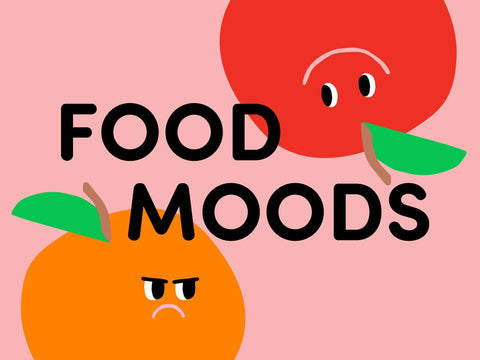Emotional and/or mental health doesn’t always fall in the same sentence with nutrition. But did you know a child’s mood can be affected by the food they are eating? It is vital to keep an eye on what you give to your kids to eat not only for their physical health but mental health as well.
A review published in NCBI talks about the importance of the relationship between mental health and dietary patterns in children. It was noted that many anxiety and mood disorders start from the age of 6 years to 13 years. Poor diet or consumption of processed foods is associated with the risk of anxiety and depression. Let us explore how a continuous poor diet is linked to mental health outcomes.
How does food affect behavior and mood in kids?

In the body, there are neurotransmitters, which are known as chemical messengers. These molecules transmit thoughts and actions in the brain. Food affects these chemical messengers that lead to changes in moods. You already know that kids are vulnerable and pretty sensitive to junk food.
While varied between children, processed foods have been shown to affect behavior and mood. Many processed foods are packed with trans fat and lack key nutrition that kids require. According to ‘The SUN Project’, the intake of trans fat led to a forty-eight percent increase in depression.
Kids’ moods also fluctuate when they consume food additives like artificial colors and the preservative sodium benzoate. A study from the University of Southampton showcases the evidence that kids consuming mixtures of food colors have increased levels of hyperactivity as well as some children exhibited allergic reactions.
In addition to food, gut health is a culprit affecting mood as well.
How does the gut affect a child’s mood?
A study published in NCBI confirms that gut health is connected with the brain. Moreover, according to the researchers at Ohio State University, gut bacteria take a toll on the temperament of toddlers. There are good and bad bacteria in the gut, and having a proper balance is a must when it comes to the health of kids. These microorganisms secrete numerous chemicals that act as substances used by neurons for communicating and regulating mood.
If a child gets angry at little things or he/she lacks motivation and has trouble in communication, then it is clear she/he is having some imbalances in their gut. That said, abnormalities in gut bacteria can cause hyperactivity, depression, anxiety, and even autism spectrum disorders. Therefore, having a healthy gut or microbiome is of utmost importance.
Foods to boost your child’s gut health
It is vital to feed foods to kids that can keep their microbiome healthy. You can count on the following foods to not only maintain their good gut health but overall optimal health. These foods boost the immune system and promote optimal digestive health.
High-fiber foods: It is one of the vital components of the diet for kids that help in achieving great gut health. You can give flax seeds (crushed are easy to add to food without them knowing) to your kids as it has omega-3 content and is a great fiber source. Also, giving them different fruits and vegetables will make them thrive because they contain a variety of minerals and vitamins. Lentils and nuts are other strong sources of fiber.
Probiotics or Fermented foods: You can also consider giving fermented foods to kids as they can also enhance their gut health! Yogurt and kefir contain beneficial bacteria that make it easy to digest. Kimchi and sauerkraut are also some of the super gut-healthy fermented foods. Both of them are living fermented foods that are the great sources of dietary fiber and vitamins. A child’s underdeveloped palate can make consuming these hard, so we recommend a daily probiotic to supplement as needed.
Do not forget this!
Eating these foods is crucial to maintain excellent gut health. Of course, washing hands and removing your shoes in the house is a good practice yet be careful about chemically over-sanitizing. Send your kids outside to play, let them do gardening or make mud pieces. These activities are not only healthy but therapeutic as well. In fact, these are some amazing ways to boost their immune system and gut health.
Ending note
It is important to stabilize the mood of your kids. Therefore, you have to make sure to keep their gut healthy. No doubt bad eating habits can result in sleep disturbances and poor digestion. So, give them a varied diet and let them enjoy their childhood to the fullest.
Contributed By: Pamela Wirth for Hello Health




